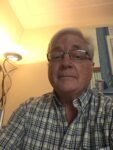Finding the Form With John Vardon
By John Vardon
The person who said that there is no such thing as a stupid question was obviously not an author, especially one enduring interviews on a book-promotion tour or answering questions at the end of a reading. Having attended many literary readings, I dread the usual questions about where authors get their ideas or those prefaced by statements like “My question, more of a comment really, is in three parts.” Examples of questionable questions are sadly easy to find but my favourite is the one that a TV interviewer once asked Mordecai Richler: “Is this book of yours, Mordy, based on fact, or is it something you made up in your own head?” So I am always impressed when authors answer these these questions with patience, tact, and grace and try my best in interviewing writers to avoid the overly personal, impertinent or predictable.
To be fair, interviews (or in this case, more of a conversation) in literary magazines are seldom so egregiously silly but it’s still advisable to do your literary homework before asking questions that the author is tired of answering.
All of this serves in a roundabout way as my response to “finding the form” in my conversation with Evelyn Lau. The more sensational facts of her earlier life are a matter of public record, and she has written about them herself with a candidness that is beyond my own limits of personal disclosure. But what interests me about her once turbulent and now, I hope, more tranquil life is the stubborn persistence of poetry. I am interested in its language, its form, the process by which a poem forms in the mind and then on the page, and the way in which editors can facilitate and enhance the finished product.
My “homework” for any interview or review begins by reading as many previous interviews and books as as I can by the author, a task not easily achieved if the literary object of your attention is an established poet. Limited print runs of small presses mean that copies of early out-of-print collections are not easily obtained. Fortunately, I have been collecting books since grad school and have a sizeable library, so I already owned several of her books, both fiction and poetry. Just as fortunately, I live in a twin city with a good public library system, two university libraries, and three excellent used book stores. Nonetheless, I still had to order two of Evelyn’s books on-line via Amazon-owned Abebooks.

For a conversation, finding the form also involves finding the medium. Evelyn was more interested in a telephone discussion than one conducted by email, presumably because it would be more spontaneous and less time consuming. This proved to be easier than I thought, thanks to something called voice memo on my computer and my wife’s technological assistance. In the days before email, says the old geezer, personal interviews were much more onerous. One of mine involved recording questions and answers on a cassette tape so small it looked like the one whose message self-destructed in the opening segment of the television series Mission Impossible. Then and now, however, what’s required is the often undervalued skill of transcription, which in this case was done quickly and efficiently by my daughter Elena.
Literary interviews give writers a chance to challenge common misconceptions, perhaps offer insights on the genre in which they write, or provide interesting details about their craft. It’s even better if there is a surprise or two. One was that, after all my questions about her, Evelyn Lau asked one or two about me, including a perfectly innocent one touching on an issue that I have never fully come to terms with: being a poetry editor without ever having written a poem. Another was that she has, apparently forever, forsaken prose in favour of the decidedly unprofitable but ever pleasing practice of poetry.

After about 35 years of writing, interviewing, and editing for TNQ, John Vardon has had an article accepted for an upcoming issue of Canadian Notes and Queries.

